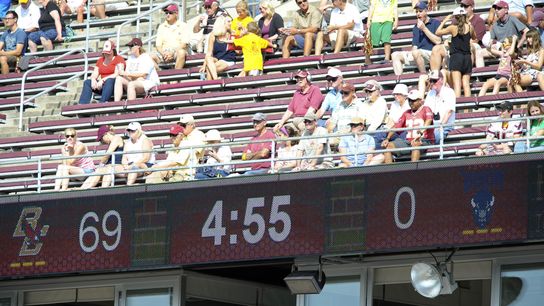College football officials are considering potentially drastic overhauls to the way games are timed, according to a report Monday from Ross Dellenger of Sports Illustrated.
One proposal would go to an NFL-style timing rule, where the clock continues to run after first downs except in the final two minutes of each half. Another proposal would see the clock wind after the ball is spotted for play following incomplete passes.
The push to shorten games is two-fold. First, the average FBS game lasted 3 hours and 21 minutes in 2022, a 5-minute increase from 2019 and more than 10 minutes longer than the average NFL game.
Second, officials have looked into shortening games as a safety issue. With the College Football Playoff expanding from four teams to 12 beginning in 2024, two teams could potentially play in as many as 17 games. In 2022, TCU attempted and defended 2,092 scrimmage plays in its 15-game path to the national title game.
Adopting NFL-style clock rules would eliminate between seven and nine plays per game. Winding the clock after incompletions could eliminate close to 20 plays per game, but such a radical change could come with an unintended consequence that could make the game even more dangerous. From SI:
Offenses, many of which already operate in a hurry-up mode, would move to “super turbo,” as one official said, potentially negating the elimination of plays and heightening the risk of injury.
The SI report includes one difference between the college and professional game but, in typical college football fashion, glosses right past it. Officials can stop college football games down for an unlimited number of replays, but there appears to be no immediate push to curtail the power of replay officials. From SI:
FBS games see about 2.3 replay stoppages per game, a figure that continues to rise and has officials considering a coaches challenge system—something that seems likely in the future.
Officials are also considering two minor changes that are expected to pass. In an effort to speed games up, coaches would no longer be able to call consecutive timeouts -- most commonly seen in "icing the kicker" situations -- and defensive penalties at the end of the first and third quarters would carry over to the following quarter. Currently, defensive penalties in those situations are immediately replayed as untimed downs.
Potential changes are expected to be discussed at next month's NCAA Football Playing Rules Committee and could come into effect as soon as this fall. It's unclear at this time if any changes would apply to the lower divisions.
